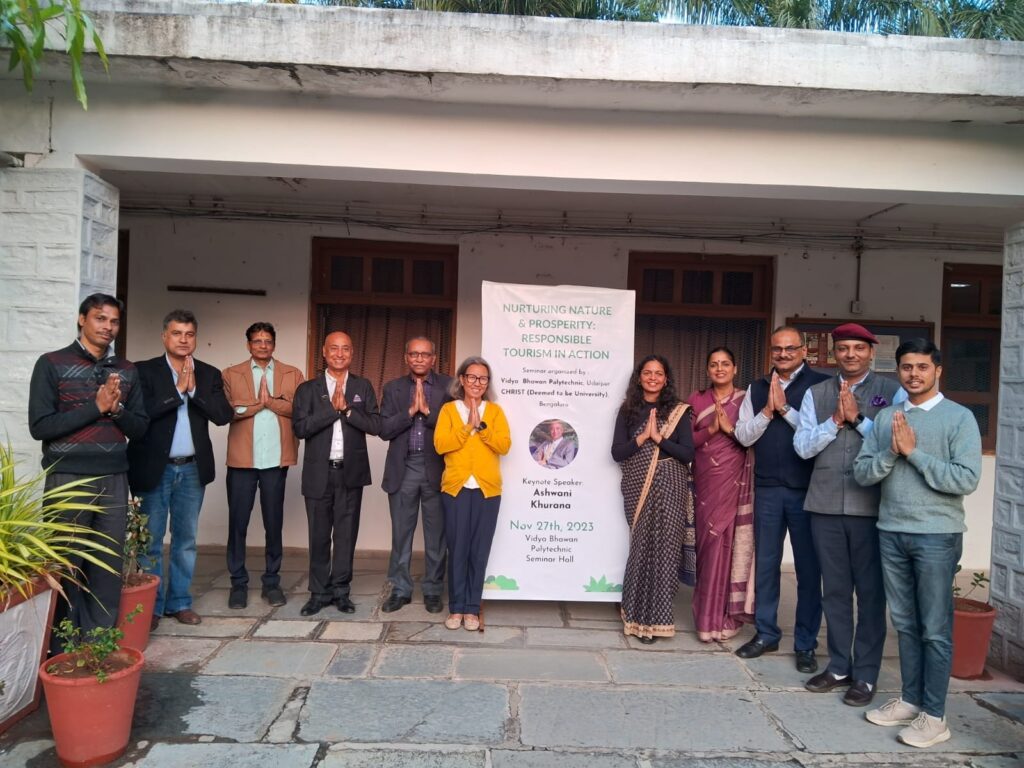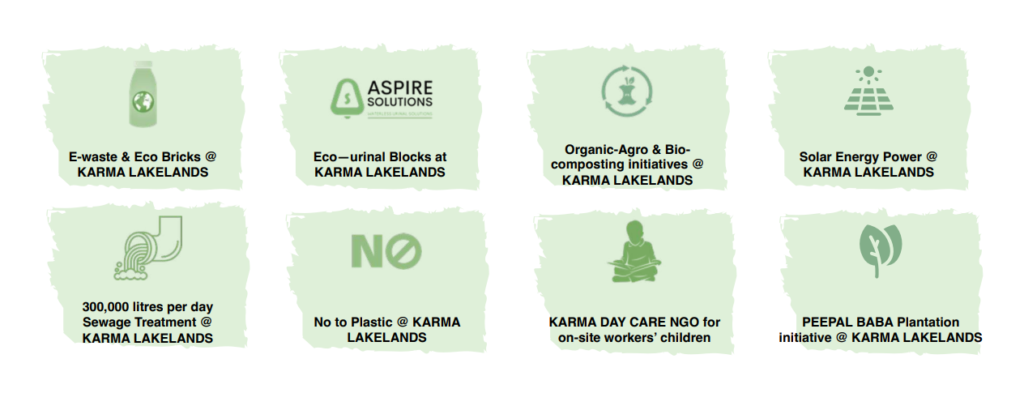With more than four-decades of exemplary experience in successfully pursuing eco-friendly business practices, Ashwani Khurana has created a model that is worth emulating. He shared nuggets of green wisdom during his keynote address in a seminar in Udaipur
RAO NARENDER YADAV / The PressIndia
The scenic natural beauty of Udaipur and its rich cultural history ensures an unforgettable experience for visitors. Often referred to as the ‘Venice of the East’, nestled among the Aravalis, the city of lakes boasts of incredible hospitality and warmth. The popular tourist destination attracts millions of visitors annually to admire its glowing splendour resplendent with picturesque surroundings. At the same time, it also raises pertinent questions about the sustainability of tourism industry. These extremely important issues were discussed during a seminar “Responsible Tourism for Nature and Prosperity” organised at Vidya Bhavan Polytechnic in the city recently.
Delivering the keynote address, renowned eco-entrepreneur Ashwani Khurana emphasised that “Tourism businesses should strive to make their premises carbon, water, and energy-neutral, as this would ensure long-term sustainability along with increase in the number of tourists.” Khurana shared real-life practices and anecdotes from his own life that could bring a fundamental shift in the way tourism industry cam grow and thrive without compromising on the environmental issues. He emphasized on the need for hotels and resorts to ensure minimal waste generation, proper waste disposal, maintain ambient air-quality and reduce pollution. He stressed that eco-friendly tourism practices will act as a catalyst for their businesses, making it a win-win situation for both.
Specifically talking about the waterless urinal solutions, he said that businesses flush million litres of fresh portable water down the drain each year and waste money on this process too. “The conventional urinals use water to remove the leftover part of urine form the urinal bowl but water doesn’t eliminate or prevent the bad odour. The main cause of odor and smell is ammonia (NH3) which forms when water and uric acid gets mix up.” The water-free urinal technology digest the urine organic crystals rapidly, as it contains ten times more biological bacteria, resulting in fresh and hygienic washrooms as well as saving huge amount of water.

In a first-of-its-kind initiative, the seminar brought together stakeholders from the tourism industry and environmental conservation sector on a platform to discuss and deliberate on sustainable tourism practices. The event was a collaborative effort between Vidya Bhavan Polytechnic’s Water Forum and the Tourism Department of Christ University, Bangalore. Other speakers in the seminar were Dr. Lalit Pandey, President, INTACH Udaipur, Digvijay Singh from the Guide Association, former officers from the Indian Forest Service – O.P. Sharma, and Rahul Bhatnagar, Yash Sharma from UCCI (Udaipur Chamber of Commerce and Industry) to name a few. The seminar, chaired by Dr. Anurag Priyadarshi, Chief Executive of Vidya Bhavan, was organized by Dr. Anil Mehta, who briefed about the need and objective of this comprehensive discussion. Environmentalists Dr. Arun Jakariya, Dr. A.R.L. Shrimaal, Kushal Rawal, Jaydev Joshi, and Danish also discussed the environmental challenges faced by Udaipur, including the depleting habitat for migratory birds and the need for effective conservation.
Industry trailblazer
With more than four-decades of exemplary experience in successfully pursuing eco-friendly business practices, Khurana has created a model that is worth emulating. He has successfully redefined the way how sustainable tourism practices can generate exponential growth in the hospitality sector As the founder & CEO of Karma Lakelands in Gurugram, he has built a unique green township, with eco-responsible golf resort and residences. This green oasis has incorporated eco-friendly practices ranging from bio-composting, organic agriculture, rainwater harvesting, water recycling, solar energy, kitchen and plastic waste recycling, e-waste segregation for responsible disposal, and eco-bricks to even ‘no-horn’ zone policy.
“Our bee farming initiative improves the health of agriculture and plant life in a 7-8 km radius in and around Karma Lakelands, as bees are known to be the best pollinators on the planet. We also produce and package fresh organic honey which is tastier and healthier than mass produced products. Rainwater is channelized and harvested for irrigation purposes and for sustainable environment. The domestic wastewater is organically treated and used for herb and vegetable garden in the premises. It also has a mini dairy farm,” he shares. All kitchen-waste is sorted on site and recycled to feed the farm animals or is used for making organic compost.

An environmentalist at the core with single-focussed determination to make businesses eco-friendly, his ‘Responsible Living’ practices are worth emulating by the hospitality industry.
A green crusader
Khurana embarked on his unique green journey several decades back when in 1986 he vowed to plant 100,000 trees. As of September 2023, nearly 280,000 trees have already been planted. This early spark, which later took the shape of a life-long mission, came after a chance meeting with legendary Nek Chand, founder of the famed Rock Garden in Chandigarh.

This eco-wisdom led Khurana to put his surplus revenue in purchasing rural and suburban lands/real estate with the sole purpose of planting trees. In 1994 he also started an ambitious social forestry programme in the campus of Tihar Jail. He donated thousands of fruit and shade trees, which were planted by the prison staff and inmates themselves. His environmental activism has resulted in the harvesting of an astounding 360 million litres of rainwater annually at the Qutub Golf Course in New Delhi.
Ashwani Khurana, who has been nominated for Padma Shri Award 2024, has undoubtedly developed a unique perspective on doing business – marked by harmony and admiration for nature.